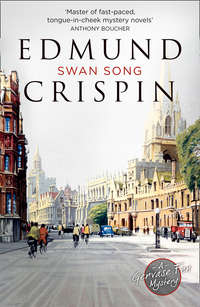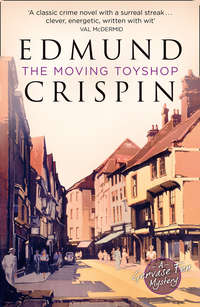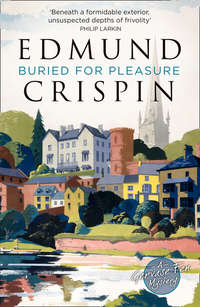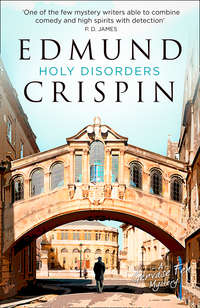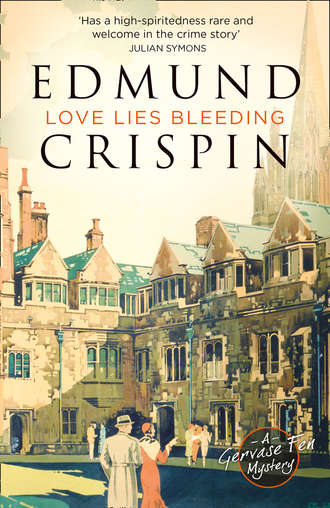
Полная версия
Love Lies Bleeding
‘She acts well,’ said Mathieson.
‘But apart from that – as a personality.’
Mathieson hesitated before replying. ‘To be frank, headmaster, she seems to be rather a sexy young creature.’
‘Yes, I’m glad to have you confirm that. The situation is that she arrived home from last night’s rehearsal in a state of considerable agitation, and we can’t find out what upset her.’
‘She was perfectly all right during the rehearsal,’ said Mathieson. ‘Almost too lively, in fact.’
‘Yes. Well, I’m pleased to hear it; it lessens our responsibility to some extent…Do you know if she has – ah – designs on any particular boy?’
‘I may be quite wrong, but I rather thought that Williams…’
‘Williams? Which Williams? There are dozens.’
‘J. H., headmaster. In the Modern Sixth. He’s playing Henry.’
‘Oh, yes, of course. I think I’d better have a word with him…By the way, your dress rehearsal’s this evening, isn’t it?’
‘Yes, sir.’
‘I’ll try and look in,’ said the headmaster, ‘if I can find the time.’
So Mathieson returned to the task of instilling Wordsworthian metaphysics into the barren intellects of the Modern Lower Fifth, and the headmaster made his way to the porter’s office, where he left instructions that J. H. Williams was to be summoned to his study immediately after morning school.
When Wells, the porter, entered the Modem Sixth room ten minutes before the end of the last period, he found Mr Etherege expounding the technics of demonology and black magic.
Wells was not greatly surprised at this. Mr Etherege was one of those leavening eccentrics who are sometimes to be found at a large public school, and he had been at Castrevenford for so long that he now legislated for himself, both as to what he taught and as to how he taught it. He had a fancy for the esoteric and remote, and among his more recent obsessions were yoga, Notker Balbulus, an obscure eighteenth-century poet named Samuel Smitherson, the lost island of Atlantis and the artistic significance of the blues. No boy passed through his hands without acquiring some knowledge of whatever obscure and useless subject happened to interest him at the moment.
The framers of education acts have little use for such dominies as Mr Etherege; but in this, as in so many other things, they are grossly impercipient. The fact is that every large school requires an advocatus diaboli – and at Castrevenford Mr Etherege occupied this important post. He was flagrantly lacking in public spirit. He never attended important matches. He was not interested in the spiritual welfare of his boys. He lacked respect for the school as an institution. In short, he was impenitently an individualist. And if, at first sight, these characteristics do not appear particularly commendable, you must remember their context. In a school like Castrevenford a good deal of emphasis is necessarily laid on public spirit, and the thing is liable to develop, if unregulated, into a rather dreary fetish. Mr Etherege helped to keep this peril at bay, and consequently the headmaster valued him as much as his more sternly dutiful colleagues. His divagations from the approved syllabus were the price that had to be paid, and its evils had in any case been minimized by the removal from his timetables of all work for important examinations.
Cautiously skirting the mirific sign of the pentagram which was chalked on the floor, Wells delivered the headmaster’s message to Mr Etherege, who passed it on, embroidered with pessimistic conjecture, to J. H. Williams. Wells departed, and Mr Etherege commented briskly on the Grand Grimoire until an electric bell, shrilling violently throughout the building, indicated that morning school was over; at this he uttered a cantrip, designed, as he said, to protect J. H. Williams from bodily harm during his interview with the headmaster, and dismissed the class. Williams – a dark, clever, good-looking boy of sixteen – at once made his way through a jostling, clamorous, rout of his contemporaries to the headmaster’s study, his vague apprehensions unallayed by Mr Etherege’s promise of supernatural protection.
He found the headmaster gazing out of his window, with his hands clasped behind his back.
‘Williams,’ said the headmaster without preliminary, ‘you must not make assignations with young women.’
A moment’s reflection had persuaded him that this was the likeliest gambit for their interview. He knew that Williams was a candid and sensible boy, who would deny such an accusation only if it were untrue.
Williams went red in the face. ‘No, sir,’ he said. ‘I’m sorry, sir.’
‘Be more accurate, Williams,’ the headmaster admonished him mildly. ‘If, at your age, you’re sorry that you arranged to meet an attractive girl, then you ought to be examined by a doctor…The phrase you should use in such circumstances is: “I apologize”.’
‘Yes, sir,’ Williams agreed, rather helplessly.
‘And where exactly was this rendezvous?’
‘In the science building, sir.’
‘Ah. I take it, then, that the arrangement was made during last evening’s rehearsal?’
‘Yes, sir. The rehearsal ended at nine forty-five. So there was a quarter of an hour to spare before I needed to be back at my house.’
The headmaster made a mental note that this gap must not be allowed to occur next year.
‘This appointment,’ he said, ‘was it made on your own initiative?’
‘Well, sir’ – Williams risked an apologetic grin – ‘one might say it was a cooperative effort.’
‘Indeed.’ The headmaster considered for a moment. ‘Have you any excuses to make?’
‘Well, sir, I don’t know if you’ve actually seen Brenda, sir—’
The headmaster interrupted him. ‘Yes, that’s obviously the only justification you could offer: Vénus tout entière à son Williams attachée. Being in the Modem Sixth, you should know your Racine.’
‘It’s only natural at my age, sir,’ Williams murmured hopefully, ‘as you said yourself.’
‘Did I?’ said the headmaster. ‘That was indiscreet of me. But if we all gave way to our natural impulses as and when we felt like it, we should soon be back at the Stone Age…What exactly happened during your meeting with this young woman?’
Williams looked surprised. ‘Nothing, sir. I wasn’t able to turn up.’
‘What?’ the headmaster exclaimed.
‘Mr Pargiton caught me, sir, just as I was leaving the hall. As you know, sir, we’re supposed to go back to our houses immediately the rehearsal’s over, even if it finishes early…And of course, I was heading at the time in the opposite direction to Hogg’s. Mr Pargiton’ – Williams’ tone betrayed considerable resentment – ‘took me back and handed me over to Mr Fry.’
The headmaster reflected that Pargiton’s officiousness, which was normally rather tiresome, had its uses after all.
‘And you’re prepared to swear,’ he said, ‘that after the rehearsal you never set eyes on the girl?’
‘Yes, sir. That’s the truth.’
The headmaster sat down abruptly in the swivel chair behind his desk. ‘As I said before, you must not make assignations with young women.’
‘No, sir.’
‘Nor must you, on leaving this room, go round complaining about obscurantist repression of wholesome desires.’
‘No, sir, I shouldn’t dream—’
‘Your mind, Williams, is probably full of half-baked Freudian dogma.’
‘Well, actually, sir—’
‘Forget it. God forbid that you should be permanently celibate. But the term lasts only twelve weeks, and if you can’t abstain from the opposite sex for that length of time without suffering psychological damage, then your brain is an altogether feebler instrument than I’ve hitherto believed.’
Williams said nothing; his logic was incapable for the moment of contending with all this.
‘And in conclusion,’ the headmaster remarked, ‘kindly remember that there will be hell to pay if you attempt to meet this girl again…Now go away.’
And Williams took himself off, mightily pleased both at the efficacy of Mr Etherege’s spell and at the headmaster’s directness and good sense. He did not suspect that the headmaster’s directness and good sense had been carefully calculated so as to appeal to his own youthful mixture of idealism and cynicism. The headmaster had had considerable practice in getting the results he wanted.
Perceiving that Pargiton lingered in front of the teaching block, the headmaster sought, and found, confirmation of Williams’ narrative. He then telephoned to the High School and gave Miss Parry a concise summary of what he had learned.
‘I see,’ she said. ‘In that case, I’ll return to the attack. How long could Brenda have waited in the science building?’
‘Until about half past ten, I suppose, when Wells locks it up for the night.’
‘Good. Thank you very much.’
‘By the way,’ the headmaster added, ‘you might let me know what results you get.’
‘Of course,’ said Miss Parry. ‘I’ll telephone you later on.’
‘Later on’ proved to be about ten minutes before the beginning of afternoon school.
‘Look here,’ said Miss Parry, ‘are you quite certain that boy is telling the truth?’
‘I’m positive,’ the headmaster replied. ‘Why?’
‘Brenda denies that she ever went anywhere near the science building.’
‘Oh, Lord…Well, mightn’t that simply mean she was leading Williams up the garden path?’
‘It may. I don’t know.’
‘Does she deny having arranged to meet Williams?’
‘No. She wanted to at first, but I think that was only to protect the boy. She maintains that she thought better of it, and went home instead.’
‘I see…No other information?’
‘Nothing. The girl’s as obstinate as a donkey…There’s only one thing I’m sure of.’
‘What’s that?’
‘Something,’ said Miss Parry, ‘has nearly frightened her out of her mind.’
3
Thieves Break in and Steal
The site of Castrevenford School is a substantial rectangle, bounded on the west by the river Castreven and on the east by a main road. Elsewhere the line of demarcation is vaguer: northwards the playing fields peter out indeterminately into farming land, while to the south there is a confusing huddle of school buildings adjacent to a disorganized cluster of houses named Snagshill, which is a suburb both of Castrevenford and – more definitely – of the school itself. The main teaching block – a large but comfortless eighteenth-century erection of red brick, ivy-covered and a kind of game reservation for mice – stands isolated on the western boundary, with a clock tower, roofed by well-oxidized copper, surmounting it. From it, a gentle slope, planted with elms and beeches and riddled with rabbit warrens, runs down to the river bank. Here the school boathouse is situated, and a substantial landing stage. Across the river there are fields, woods, a distant grange; and beyond them can be seen the towers and spires of Castrevenford town, three miles upstream.
The boarding houses are seven in number, scattered irregularly about the circumference of the site. At the north-eastern angle is the chapel, an uncommonly hideous relic of late Victorian times, put up with such parsimony and haste that the authorities go in hourly fear of its subsidence or total collapse. The school gates open on the main road. A long drive runs from them, through an avenue of oaks, to the teaching block – which may be most conveniently referred to by its tide of Hubbard’s Building. Near the gates is the hall, severely box-like and utilitarian. The science building, the scout hut, the armoury and the library are grouped together on the south side near Davenant’s, which is the largest of the boarding houses. In it the headmaster’s study is situated, since his private house is half a mile away from the site.
The rest of the area is occupied by playing fields, squash and fives courts, the gymnasium, the swimming pool, the tuck shop, and the carpenter’s workshop. It is provided with a complex tracery of asphalt paths designed specifically, in the view of the boys, to make them walk the maximum possible distance between their houses and Hubbard’s Building.
It was this scene – or at all events a part of it – that the headmaster contemplated as he stood at his study window, meditating the problem of Brenda Boyce. At five minutes to two the school bell began tolling, and the headmaster, finding his conjectures profitless, fell to considering whether, in spite of the more conservative members of the staff, its wretched clangour should not be permanently silenced. The thing was intended, of course, to encourage punctuality; but it had not been used during the war, and the resumption of its daily tintinnabulation had resulted in no appreciable decrease in the steady minority of latecomers. There were too many bells at Castrevenford altogether. There were the clock chimes, which sounded the hours, halves and quarters with peevish insistence; the bells in the science building; the electric bell which marked the beginning and end of each lesson; the handbells in the houses; the chapel bell, which had obviously suffered some radical mishap during its casting…
By now the site was filled with ambling droves of boys, converging on Hubbard’s Building with books and files under their arms. And among them the headmaster observed Mr Philpotts, running across the dry grass towards Davenant’s.
Mr Philpotts was a chemistry master whose principal characteristic lay in a sort of unfocused vehemence, resulting in all probability from an overplus of natural energy. He was a small, stringy man of about fifty, with immense horn-rimmed spectacles, a long, sharp nose, and an unusual capacity for garrulous incoherence. In his present haste lay no reason for apprehension or surprise; he always ran, in preference, apparently, to walking. But unfortunately he was of a complaining disposition; the smallest upset was liable to bring him scurrying to the headmaster’s study, full of ire and outraged dignity; and the headmaster, watching his approach, had little doubt that in another minute or so Mr Philpotts would be assaulting his ear with some complicated tale of woe.
The prospect did not depress him unduly, since the wrongs and affronts which Mr Philpotts suffered seldom demanded more than a little tact in their settlement. And so, when Mr Philpotts knocked on the study door, it was with a cheerful voice that the headmaster invited him in.
It soon became plain, however, that Mr Philpotts had something of more than ordinary importance to relate.
‘A scandal, headmaster,’ he panted. ‘A most dangerous and wanton act.’
He was invited to sit down, but declined.
‘The perpetrator must be found and punished,’ he proceeded. ‘Most severely punished. Never in all my experience as an assistant master—’
‘What is the matter, Philpotts?’ the headmaster interposed with some severity. ‘Begin at the beginning, please.’
‘A theft,’ said Mr Philpotts emphatically. ‘Nothing more nor less than a theft.’
‘What has been stolen?’
‘That’s exactly the point,’ Mr Philpotts spluttered. ‘I don’t know. There’s no means of telling. I can’t be always stocktaking. There isn’t the time. And what with Common Entrance, and speech day, and the mid-term reports—’
‘Then something has been taken from the chemistry laboratory?’ the headmaster demanded after a moment’s rapid diagnosis.
‘A cupboard has been forced open,’ Mr Philpotts explained with indignation. ‘Forced open and rifled. I warn you, headmaster, that I cannot hold myself responsible. Many’s the time I’ve said the locks were inadequate. Many’s the time—’
‘No one is attempting to blame you, Philpotts,’ said the headmaster smoothly. ‘What does this cupboard contain?’
‘Acids,’ said Mr Philpotts with unusual directness and pertinence. ‘For the most part, acids.’
‘A good deal of poisonous stuff, in fact?’
‘Exactly. That is what makes the offence so serious.’ Mr Philpotts inhaled violently, by way of expressing his disapproval. ‘You see, no doubt, how serious it is?’
‘Certainly I see, Philpotts,’ said the headmaster with considerable asperity. ‘By some miracle, my judicial faculties are still functioning…You have no idea what, if anything, is missing?’
‘I presume that something is missing,’ said Mr Philpotts tartly. ‘Otherwise there would seem to be little point in breaking open the cupboard…The only thing I can say definitely is that no very large quantity of any substance has been taken.’
The headmaster said, ‘Very well. I shall have to consider what’s the best thing to do. In the meantime, will you see to it that the chemistry laboratory is kept locked whenever it’s not actually in use? It’s rather late in the day for such precautions, but we don’t want to be caught out a second time…By the way, when did you discover this?’
‘Last period this morning, headmaster. I wasn’t teaching until then. I can guarantee, too, that the cupboard was all right at five o’clock yesterday afternoon, because I had occasion to put some apparatus away in it.’
‘All right, Philpotts,’ said the headmaster. ‘I’ll let you know as soon as I’ve decided what steps to take.’
Mr Philpotts’ nodded importantly, left the room, and bounded away in the direction of the science building. As the headmaster returned to his window, the tolling of the school bell ceased, and such boys as were still on their way began running. A few moments later, as the clock struck two, the headmaster heard the distant trilling of the electric bell in Hubbard’s Building. A flushed and desperate latecomer scampered past, and in a last frantic burst of speed vanished from sight. There was peace.
But the headmaster scarcely appreciated it. A theft of poison – even a conjectured theft – was, as Mr Philpotts had platitudinously observed, a serious matter. Moreover, it was far from easy to decide on any effective course of action. The guilty person was not necessarily a boy – indeed the headmaster inclined, in the absence of definite evidence, to dismiss this hypothesis. But there were the groundsmen, the members of the staff, the public (who could move with relative freedom about the school premises) and, of course, Brenda Boyce, who on Williams’ showing had definitely been in the science building on the previous evening…
He bit irritably at the stem of his pipe. Though he was averse from informing the police, it was obviously his duty to do so. Very reluctantly he reached for the telephone.
It was at about this moment that Mr Etherege left the masters’ common room with Michael Somers. And as both of them were going in the same direction, they fell into conversation.
Somers was the youngest member of the Castrevenford staff – a slim, tall, wiry man, good looking but for a hint of effeminacy in the smallness and regularity of his features. He had smooth black hair, and a tenor voice whose agreeable modulations held a suspicion of artifice and self-consciousness. He taught English, and with conspicuous competence, but he was not popular with the boys, and the headmaster, who had a certain respect for the merciless perspicuity of the young, was inclined privately to distrust him on that ground. Experience had taught the headmaster that the principal, if not the only, reason for a master’s unpopularity was insincerity. Mere severity never affected the boys’ judgment unless it was associated with hypocrisy or cant; and leniency – Somers was notoriously lenient – was a bribe which by itself was incapable of winning their affection.
Somers’ colleagues regarded him with mixed feelings; the current of his conceit, though subliminal, was strong enough to be perceived. But Mr Etherege, who reputedly was devoid both of morality and of human affections, assessed his fellow-beings solely by the criterion of their suitability as an audience for his own utterances; and since Somers was appreciative and attentive, Mr Etherege held him impeccable.
‘And what,’ Mr Etherege demanded, ‘is the matter with Love?’ He was referring not to the passion which drowned Leander, but to one of his senior colleagues.
Somers looked surprised. ‘The matter?’ he said. ‘I didn’t know anything was the matter with him. How do you mean?’
Clearly this reply was disappointing to Mr Etherege. In addition to his other eccentricities he operated as a kind of central clearing house for Castrevenford scandal. In some ineluctable fashion he managed to acquire the most intimate information about everyone and everything, and he was always prepared to pass it on. But now, a likely well-spring having dried up, he was slightly aggrieved. And certainly, if Somers was ignorant of Love’s temperamental disorders, there was not much enlightenment to be hoped for elsewhere. Love had been Somers’ housemaster at Merfield, and Somers was very much his protégé. Mr Etherege sighed.
‘I should have thought,’ he said reproachfully as they toiled up a flight of stone stairs, ‘that you would have noticed it.’
‘I’ve hardly seen him for the past week,’ Somers explained.
‘He seems to be consumed by some inner fury,’ said Mr Etherege. ‘He’s touchy, irascible and uncivil. Love, I freely admit, is not an exuberant man at the best of times, his innate puritanism is too strong. But this phase is quite exceptional. Obviously something has annoyed him very much.’
‘He tends to sulk,’ said Somers, ‘whenever things aren’t exactly to his liking.’
This comment struck Mr Etherege as being too obvious and uninteresting to require affirmation, or indeed, an answer of any kind.
‘In fact,’ he proceeded, ‘the school is overburdened with mysteries at the moment…By the way, how is your wrist?’ He pointed to Somers’ right arm, which was protected by a sling.
‘Pretty well recovered, thanks. But what’s all this about mysteries?’
‘You’ve surely heard about the theft from the science building?’
‘Oh, that. Yes. Philpotts told me when I was on my way in to school this afternoon.’
‘And about the High School girl?’
‘No. What High School girl?’
‘She had an assignation with J. H. Williams in the science building,’ said Mr Etherege. ‘That in itself would be nothing out of the ordinary, of course. But it appears, in the first place, that Williams didn’t turn up, since he was headed off by that busybody Pargiton; and in the second place, that the girl arrived home in a state of great distress and trembling…What do you make of that?’
They had come to the door of Somers’ form room. A half-apprehensive murmur of conversation was audible from inside. Somers shrugged, and said:
‘Could she have had anything to do with the theft?’
‘Up to the present,’ said Mr Etherege, ‘she’s refused to say a word. But it’s sinister, Somers, undeniably sinister. It’s exactly the sort of situation which ends in murder.’
The afternoon wore away. The headmaster, having telephoned the police station, spoken to the superintendent, and received the promise of a visit immediately after tea, went on to the dictating and signing of letters and notices. At two forty-five he dismissed Galbraith, his secretary, into the next room and went to his window to watch the school disperse. On Fridays, afternoon school was bisected by the JTC parade, so that the second period began at a quarter to five instead of a quarter to three. The electric bell jangled in Hubbard’s Building, and the headmaster heard the murmur of released tension which followed. It grew quickly to an uproar, compounded of the scraping of desks and chairs, the banging of books, and the clatter of feet on wooden staircases, with overtures of talk and whistling. A throng of some five hundred boys poured out of the doorways, the khaki of their uniforms interspersed here and there with the blue of the Air Training Corps, and the diurnal grey of the medically unfit, clutching files, rubbing at their belts with the sleeves of their tunics, saluting the occasional non-militant master who, his work for the moment finished, mounted his bicycle and rode off down the drive. In the quarter-hour break the boys dispersed to their houses, their heavy Corps boots rattling on the asphalt. Presently the site was again deserted, save for an infrequent group of boys or masters waiting for the parade to begin. The sun shone fiercely, and the leaves of the oaks threw a network of dappled shadow over the drive. The sky was cloudless and vividly blue.





